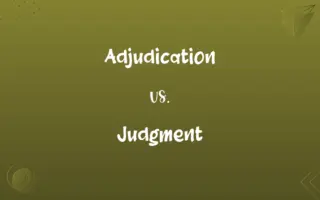Diplegia vs. Paraplegia: Know the Difference

By Shumaila Saeed || Updated on December 25, 2023
Diplegia refers to paralysis affecting symmetrical parts of the body, typically legs, while paraplegia is paralysis of the lower half of the body, including both legs.

Key Differences
Diplegia affects symmetrical areas of the body, often seen in the legs, arms, or face. Paraplegia specifically refers to paralysis of both legs and, occasionally, part of the lower body.
Shumaila Saeed
Nov 26, 2023
Diplegia is commonly associated with cerebral palsy, arising from brain damage. Paraplegia is usually due to spinal cord injuries or diseases affecting the spinal cord.
Shumaila Saeed
Nov 26, 2023
Individuals with diplegia may have motor difficulties in the affected areas but retain some level of mobility. In paraplegia, the paralysis of the lower limbs often results in a complete loss of mobility in the legs.
Shumaila Saeed
Nov 26, 2023
Treatment for diplegia often involves physical therapy and medications to improve muscle function. Paraplegia treatment focuses on rehabilitation, mobility training, and adapting to life with lower body paralysis.
Shumaila Saeed
Nov 26, 2023
The prognosis for diplegia varies depending on the severity and treatment; it often remains stable over time. People with paraplegia may require assistive devices like wheelchairs and adaptations in their living environments.
Shumaila Saeed
Nov 26, 2023
ADVERTISEMENT
Comparison Chart
Affected Body Parts
Symmetrical parts (legs/arms/face)
Lower half of the body (both legs)
Shumaila Saeed
Nov 26, 2023
Common Causes
Cerebral palsy, brain damage
Spinal cord injuries, spinal diseases
Shumaila Saeed
Nov 26, 2023
ADVERTISEMENT
Diplegia and Paraplegia Definitions
Diplegia
Diplegia is paralysis affecting symmetrical parts of the body.
The child with diplegia needed braces for walking.
Shumaila Saeed
Nov 14, 2023
Paraplegia
Paraplegia is paralysis of the lower half of the body.
After the accident, he was diagnosed with paraplegia.
Shumaila Saeed
Nov 14, 2023
Diplegia
Often associated with cerebral palsy.
Diplegia is a common form of cerebral palsy.
Shumaila Saeed
Nov 14, 2023
Paraplegia
Involves the loss of mobility in both legs.
Paraplegia has confined him to a wheelchair.
Shumaila Saeed
Nov 14, 2023
Diplegia
Diplegia can cause weakness in the limbs.
Her diplegia manifested in muscle weakness in her legs.
Shumaila Saeed
Nov 14, 2023
ADVERTISEMENT
Paraplegia
Requires adaptive equipment for mobility.
Adaptive technologies have improved his life with paraplegia.
Shumaila Saeed
Nov 14, 2023
Diplegia
Involves impaired motor function in affected areas.
Physical therapy helps improve motor skills in diplegia.
Shumaila Saeed
Nov 14, 2023
Paraplegia
Treatment focuses on rehabilitation.
He underwent intense rehabilitation for his paraplegia.
Shumaila Saeed
Nov 14, 2023
Diplegia
Often a developmental condition from early life.
Diplegia has been a part of his life since infancy.
Shumaila Saeed
Nov 14, 2023
Paraplegia
Often results from spinal cord injuries.
The spinal cord injury led to her paraplegia.
Shumaila Saeed
Nov 14, 2023
Paraplegia
Complete paralysis of the lower half of the body including both legs, usually caused by damage to the spinal cord.
Shumaila Saeed
Oct 19, 2023
Diplegia
(medicine) Paralysis that affects symmetrically opposed parts of the body.
Shumaila Saeed
Oct 19, 2023
Paraplegia
(pathology) A condition where the lower half of a patient's body is paralyzed and cannot move.
Shumaila Saeed
Oct 19, 2023
Paraplegia
Palsy of the lower half of the body on both sides, caused usually by disease of the spinal cord.
Shumaila Saeed
Oct 19, 2023
Paraplegia
Paralysis of the lower half of the body (most often as a result of trauma)
Shumaila Saeed
Oct 19, 2023
Repeatedly Asked Queries
What is diplegia?
Diplegia is paralysis affecting symmetrical parts of the body.
Shumaila Saeed
Nov 26, 2023
Can diplegia affect the arms?
Yes, diplegia can affect arms, though it's more common in legs.
Shumaila Saeed
Nov 26, 2023
What defines paraplegia?
Paraplegia is paralysis of the lower half of the body.
Shumaila Saeed
Nov 26, 2023
How common is diplegia?
Diplegia is relatively common in cerebral palsy cases.
Shumaila Saeed
Nov 26, 2023
What are the main causes of paraplegia?
Spinal cord injuries or diseases are the main causes of paraplegia.
Shumaila Saeed
Nov 26, 2023
Is paraplegia associated with chronic pain?
Some individuals with paraplegia may experience chronic pain, often related to muscle spasms or pressure sores.
Shumaila Saeed
Nov 26, 2023
How is mobility affected in paraplegia?
Mobility is significantly affected in paraplegia, often requiring a wheelchair.
Shumaila Saeed
Nov 26, 2023
How is paraplegia different from quadriplegia?
Paraplegia affects the lower half of the body, while quadriplegia affects both the arms and legs.
Shumaila Saeed
Nov 26, 2023
What are the common challenges faced by individuals with paraplegia?
Common challenges include mobility limitations, loss of sensation, and the need for assistive devices like wheelchairs.
Shumaila Saeed
Nov 26, 2023
Is paraplegia always permanent?
Paraplegia is often permanent, but rehabilitation can improve quality of life.
Shumaila Saeed
Nov 26, 2023
Is paraplegia a progressive condition?
Paraplegia itself is not progressive, but complications from immobility can arise if not properly managed.
Shumaila Saeed
Nov 26, 2023
Are there support groups or organizations for individuals with paraplegia?
Yes, there are many support groups and organizations that provide resources, advocacy, and community for individuals with paraplegia and their families.
Shumaila Saeed
Nov 26, 2023
What symptoms accompany diplegia?
Diplegia symptoms include muscle stiffness and motor difficulties.
Shumaila Saeed
Nov 26, 2023
What are the common symptoms of diplegia?
Common symptoms include muscle stiffness, difficulty walking, and challenges with fine motor skills.
Shumaila Saeed
Nov 26, 2023
Is diplegia the same as spastic diplegia?
Spastic diplegia is a specific subtype of diplegia characterized by muscle stiffness or spasticity.
Shumaila Saeed
Nov 26, 2023
Can paraplegia result from diseases other than spinal cord injury?
While spinal cord injury is the most common cause, certain diseases or conditions can also lead to paraplegia in rare cases.
Shumaila Saeed
Nov 26, 2023
Is diplegia a progressive condition?
Diplegia itself is not typically progressive, but the symptoms and functional limitations may change over time.
Shumaila Saeed
Nov 26, 2023
Is diplegia limited to the legs?
While diplegia primarily affects the legs, it can also impact the arms and other parts of the body to a lesser extent.
Shumaila Saeed
Nov 26, 2023
Can diplegia be caused by genetics?
There is a genetic component to some cases of diplegia, but it is often related to brain injuries or developmental issues.
Shumaila Saeed
Nov 26, 2023
Share this page
Link for your blog / website
HTML
Link to share via messenger
About Author
Written by
Shumaila SaeedShumaila Saeed, an expert content creator with 6 years of experience, specializes in distilling complex topics into easily digestible comparisons, shining a light on the nuances that both inform and educate readers with clarity and accuracy.








































































